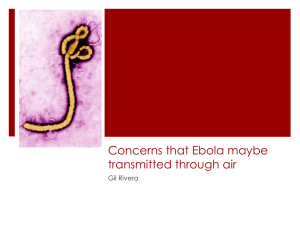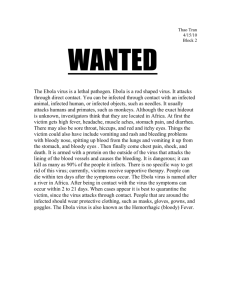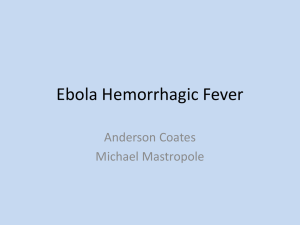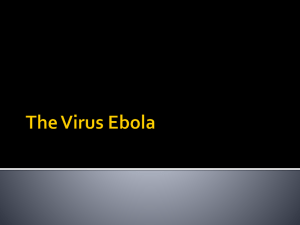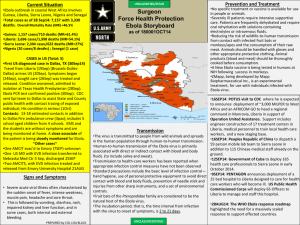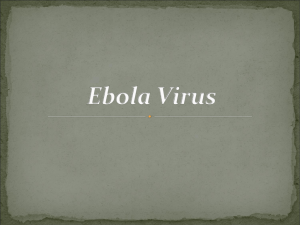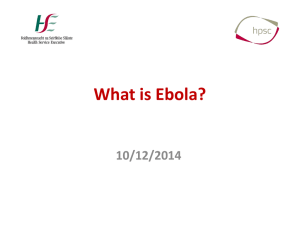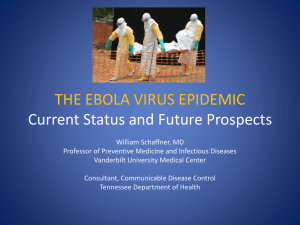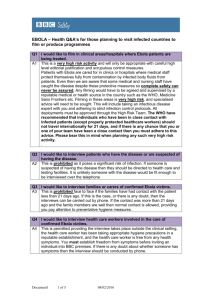How is it spread between individuals?
advertisement
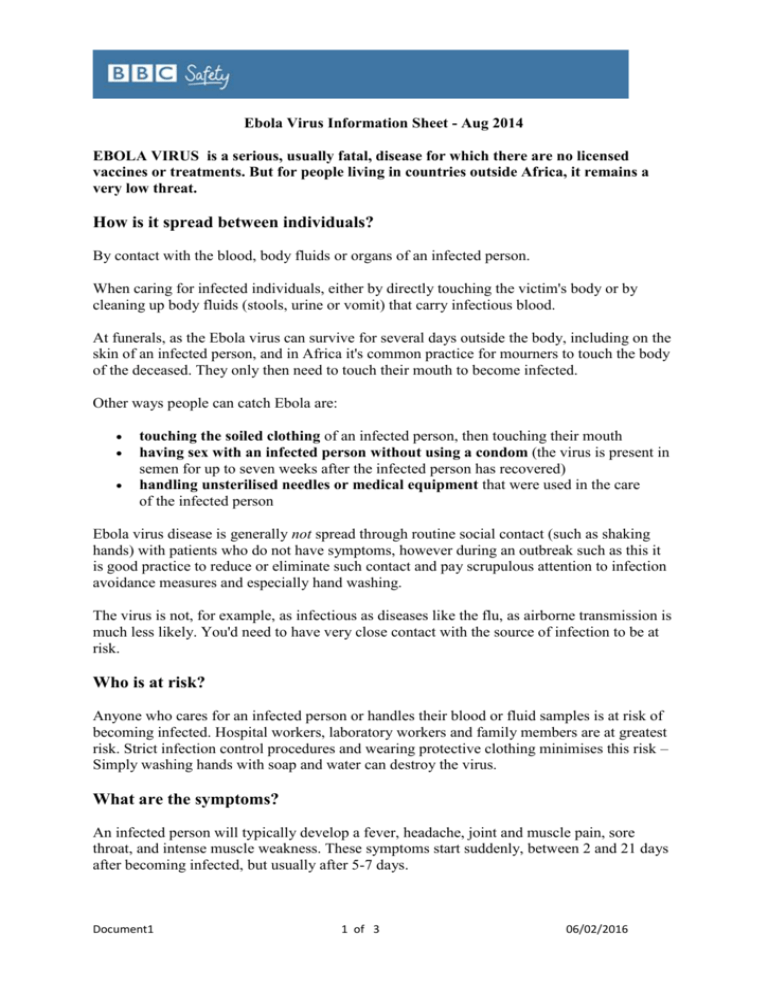
Ebola Virus Information Sheet - Aug 2014 EBOLA VIRUS is a serious, usually fatal, disease for which there are no licensed vaccines or treatments. But for people living in countries outside Africa, it remains a very low threat. How is it spread between individuals? By contact with the blood, body fluids or organs of an infected person. When caring for infected individuals, either by directly touching the victim's body or by cleaning up body fluids (stools, urine or vomit) that carry infectious blood. At funerals, as the Ebola virus can survive for several days outside the body, including on the skin of an infected person, and in Africa it's common practice for mourners to touch the body of the deceased. They only then need to touch their mouth to become infected. Other ways people can catch Ebola are: touching the soiled clothing of an infected person, then touching their mouth having sex with an infected person without using a condom (the virus is present in semen for up to seven weeks after the infected person has recovered) handling unsterilised needles or medical equipment that were used in the care of the infected person Ebola virus disease is generally not spread through routine social contact (such as shaking hands) with patients who do not have symptoms, however during an outbreak such as this it is good practice to reduce or eliminate such contact and pay scrupulous attention to infection avoidance measures and especially hand washing. The virus is not, for example, as infectious as diseases like the flu, as airborne transmission is much less likely. You'd need to have very close contact with the source of infection to be at risk. Who is at risk? Anyone who cares for an infected person or handles their blood or fluid samples is at risk of becoming infected. Hospital workers, laboratory workers and family members are at greatest risk. Strict infection control procedures and wearing protective clothing minimises this risk – Simply washing hands with soap and water can destroy the virus. What are the symptoms? An infected person will typically develop a fever, headache, joint and muscle pain, sore throat, and intense muscle weakness. These symptoms start suddenly, between 2 and 21 days after becoming infected, but usually after 5-7 days. Document1 1 of 3 06/02/2016 Diarrhoea, vomiting, a rash, stomach pain, followed by internal bleeding, and may also bleed from the ears, eyes, nose or mouth. Ebola virus disease is fatal in 50-90% of cases. The sooner a person is given care, the better the chances that they will survive. How is it treated? There's currently no specific treatment or licensed vaccine for Ebola virus disease, although potential new vaccines and drug therapies are being developed and tested. Patients need to be placed in isolation in intensive care. Dehydration is common, so fluids may be given directly into a vein (intravenously). Blood oxygen levels and blood pressure need to be maintained at the right level and body organs supported while the patient's body fights the disease and any other infections are treated. What's the advice for travellers in at-risk areas? Following these simple precautions will minimise your risk of catching Ebola virus disease: don't handle dead animals or their raw meat don't eat 'bushmeat' avoid contact with patients who have symptoms avoid having sex with people in risk areas; use a condom if you do make sure fruit and veg is washed and peeled before you eat it wash hands frequently using soap and water (alcohol hand rubs when soap is not available), as this destroys the virus If you think you or a family member has symptoms of Ebola infection: visit a healthcare provider immediately and inform them that you may have had contact with the Ebola virus. limit contact with others and avoid all other travel It's more likely that the cause is another disease such as malaria, but you may need to be tested for Ebola as a precaution. What if I think I might have Ebola in the UK? If you feel unwell with symptoms such as fever, chills, muscle aches, headache, nausea, vomiting, diarrhoea, sore throat or rash within 21 days of coming back from Guinea, Liberia or Sierra Leone, you should stay at home and immediately telephone 111 or 999 and explain that you have recently visited West Africa. These services will provide advice and arrange for you to be seen in a hospital if necessary so the cause of your illness can be determined. There are other illnesses that are much more common than Ebola (such as flu, typhoid fever and malaria) that have similar symptoms in the early stages, so proper medical assessment is really important to ensure you get the right diagnosis and treatment. Document1 2 of 3 06/02/2016 It is also really important that medical services are expecting your arrival and calling 111 or 999 will ensure this happens. How is it diagnosed? It's difficult to know if a patient is infected with Ebola virus in the early stages as symptoms such as fever, headache and muscle pain are similar to those of many other diseases. But specialist infection clinicians will make expert judgements on what the most likely diagnosis is based on the patient’s history. If Ebola is considered a possibility on this basis, then a person would be tested for the disease. A suspect case would be isolated in a side room so as to minimise contacts with other people while they are being tested. It is only if this test is positive that the case is considered to be ‘confirmed’. If the test is positive then they will be transferred to a hospital-based high-level isolation unit. If the result is negative, doctors will test for other diseases such as malaria, typhoid fever and cholera. Dr Colin Thomas CMO 11/08/14 Document1 3 of 3 06/02/2016
